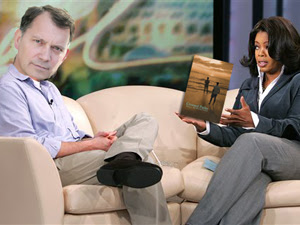
I do it. Of course I do. If I'm looking for something new to read and I'm in the library with thousands of titles to choose from, I'll undoubtedly choose something that has a cover that strikes me. If I'm in the new titles section of a bookstore, I'll pick up the ones that have groovy looking covers.
So, the steps involved in getting a new book?
1) Pick up the book with the best cover.
1b) I'll also pick up the books with the best titles (but it's secondary to a good cover).
2) Flip it over and see who has written blurbs on the back of the book. Do I recognize the authors? Do I like what they've written?
3) Read the book flap. Is the story going to interest me?
4) See the author photo on the inside back cover. Shallow, I know, but is the author good looking? If not, do they at least look interesting?
5) Read the book flap again. Is the story REALLY going to interest me?
6) Read the first sentence. I love a good first sentence.
7) Get the book.
Seven steps to get a good book and it all starts with the cover.
Perhaps it's because my wife is a graphic designer (who, in fact, designed the cover of my novel
Odd Harbor), but I've always been fascinated by the art and graphics used in creating book covers.
I'm not alone. There are plenty of websites that display and discuss book covers, including
Covers,
Foreword: A Book Design Blog and
Foreword: A Book Design Blog and the blog
Judge a Book.
Recently, the Book Design Review showcased, by their estimation, the
best book covers of 2007 (which includes the "Falling Man" cover seen above).
My favorite book cover designer?
Chip Kidd. His wonderful coffee table book,
Chip Kidd: Book One showcases his talent and he also discusses why he designs covers the way he does and the stories behind-the-scenes that readers rarely hear or read.
My least favorite book cover? Susan Orlean's
My Kind of Place. Orlean, a New Yorker staff writer who has written "The Orchid Thief" amongst other books, is a tremendous talent but does she simply want women to read her reportage? With a cover that's oozing estrogen, I felt a little uncomfortable reading it in public. Perhaps that's my own insecurities, but still, with wide-ranging travel stories included in the book, there are oodles of different covers they could have choosed from that didn't turn men away from the book.
My favorite? I'm partial to whomever designs the books McSweeney's prints, including Chris Adrian's
The Children's Hospital. Perhaps it's not my all-time favorite, but it came to mind.
Judging a book by the cover? Yes I do. We all do, don't we?





























